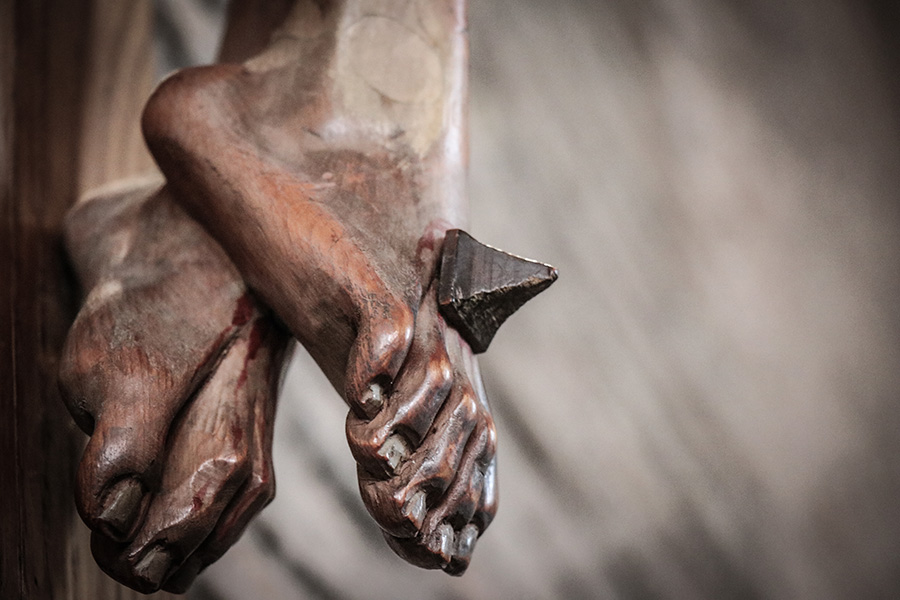It is a recurring theme to discuss whether popular religiosity, directed mainly to the heart, should prevail in the brotherhoods, or whether the direction should be given to the intelligence, to the doctrinal aspects, so as not to fall into pure sentimentalism without foundation.
I would like to participate in this discussion from experience, based on two real anecdotes taken from the day to day life of the brotherhoods.
A man in his thirties, accompanied by his wife and two little girls, came to the brotherhood to tell his story: in his childhood he had been a brother, his father, also a brother, had registered him at birth. Life had led him down a complicated path of crime and drugs. Little by little he was sinking. He had hit rock bottom. It came to him then when he approached the brotherhood of his early years, as a last resort, for help. The person in charge of charity who attended to him listened to him with all the affection he could muster, without reproach or sermons, asked him for certain documentation and assured him of the help he needed. They were scheduled for the following week.
On the day they had arranged to meet, he did not show up. Two days later the woman arrived alone, with her two daughters:
-My husband died of a heart attack the same day we had arranged to meet; but I want to tell him that the six days that have passed since we were here have been the happiest of his life. For the first time in many years he felt loved and he repeated to me: "In spite of everything, Our Lady has not grown tired of waiting for me".
A true story that touches the heart and feeling; but there is also some that goes to the head and intelligence.
In the brotherhood there is a group of volunteers who visit and accompany elderly and lonely brothers. One of these volunteers was telling me about his experience after one of these visits.
-I don't know how to explain it to you, his life seems routine and lonely, but he has learned to live on the inside. He always has an old picture of our Titulars nearby. I took him the one that was handed out at the last Main Function, but he prefers the usual one, worn out with kisses. That picture is like a mirror, the wrinkles of his face have their replica in the face of the Lord, carved by the same gouge, and his eyes retain the same intensity as those of the Virgin.
In her hands she always carries a rosary with worn beads. I assure you that his prayer is pure contemplative prayer that, at times, runs through that spiritual infancy that some call Alzheimer's disease. Any day now, with the same discretion as always, he will begin to pray the Rosary and his soul will leave unnoticed as her body is already calmto enter into the intimacy of Christ, exchanging eternal confidences with Him. I am convinced that this is how he will reach Heaven, with his old prayer-card in his hand as a safe-conduct. Pure contemplation.
Two true-to-life anecdotes that have their precedent in the Gospel.
St. Luke recounts (cf. 7:11-17) that on one occasion, as Jesus approached to a city called Naim, he saw how They were bringing out to bury a dead man, the only son of his mother, who was a widow, accompanied by many people. When the Lord saw her, took pity on herAnd he said to him, "Do not weep. And he came and touched the bier and said to the young man, "Get up! The dead man sat up, and his mother handed him over to him.
The Lord felt compassion, moved by the mother's pain, a foretaste of the pain that His mother would suffer. The miracle unleashes the emotion of those who accompanied her, who burst out in a demonstration of popular devotion.
St. John tells us of a different situation (Ch. 3): the conversation between Nicodemus, a learned man, and the Lord. We can imagine the scene, the two of them alone, barely illuminated by a candle, chatting until late at night, exchanging confidences in a low voice while Christ is opening the intelligence of Nicodemus until he leads him to the Truth.
The two situations reinforce and complement each other. To place ethics exclusively as a reference point would lead to a kind of stoic indifference, centered on the fulfillment of duty for duty's sake, without any affection contaminating it. On the contrary, allowing oneself to be carried away only by emotion leads to a pietistic sentimentalism, in which there is the danger that sentiment becomes the criterion of truth, invading the areas of understanding and will. Objective truth disappears when it is reduced to sentiment.
Head and heart complementing each other in a dynamic harmony, this is how the sororities.
D. in Business Administration. Director of the Instituto de Investigación Aplicada a la Pyme. Eldest Brother (2017-2020) of the Brotherhood of the Soledad de San Lorenzo, in Seville. He has published several books, monographs and articles on brotherhoods.








